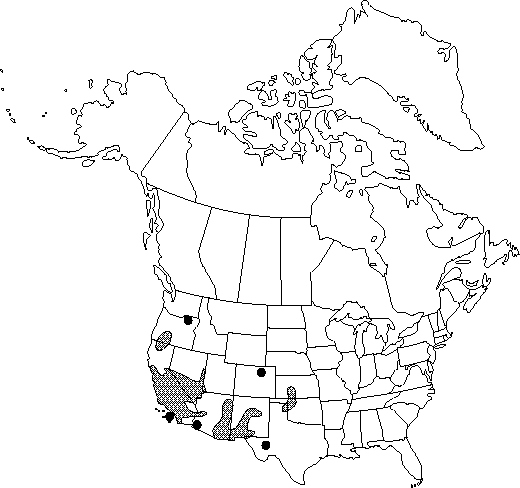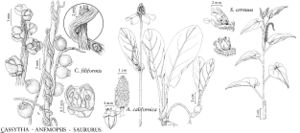Difference between revisions of "Anemopsis californica"
Bot. Beechey Voy., 390. 1840.
imported>Volume Importer |
RevisionBot (talk | contribs) m (Bot: Adding category Revised Since Print) |
||
| (3 intermediate revisions by 2 users not shown) | |||
| Line 63: | Line 63: | ||
|publication year=1840 | |publication year=1840 | ||
|special status=W2;Illustrated | |special status=W2;Illustrated | ||
| − | |source xml=https:// | + | |source xml=https://bitbucket.org/aafc-mbb/fna-data-curation/src/2e0870ddd59836b60bcf96646a41e87ea5a5943a/coarse_grained_fna_xml/V3/V3_38.xml |
|genus=Anemopsis | |genus=Anemopsis | ||
|species=Anemopsis californica | |species=Anemopsis californica | ||
}}<!-- | }}<!-- | ||
| − | -->[[Category:Treatment]][[Category:Anemopsis]] | + | --> |
| + | |||
| + | [[Category:Treatment]] | ||
| + | [[Category:Anemopsis]] | ||
| + | [[Category:Revised Since Print]] | ||
Latest revision as of 19:38, 6 November 2020
Herbs, 8-80 cm, densely pubescent to nearly glabrous, producing stolons. Basal leaves 5-60 cm; petiole 2-40 cm; blade elliptic-oblong, 1-25 × 1-12 cm, base cordate to obtuse, apex rounded. Cauline leaves dimorphic; primary leaf 1(-2), usually bearing secondary leaves in axil; blade sessile, broadly to narrowly ovate, 1-9 × 1-4 cm, base clasping, apex rounded to acute. Secondary leaves 1-4, 2-20 cm; petiole 1-12 cm; blade elliptic-oblong, 2-10 × 1-5 cm, base cordate to rounded, apex rounded to acute. Spikes erect, fragrant, conic, 1-4 cm, subtended by bracts; bracts 4-9, white to reddish, petaloid, 5-35 × 5-15 mm. Floral bracts white, ± orbiculate, 3.5-6 mm (distinct portion), clawed, each adnate to an ovary. Capsules brown, 5-7 mm, coalescent but easily separable. Seeds brown, 1-1.5 × 0.8-1 mm, reticulate. 2n = 22.
Phenology: Flowering early spring–summer.
Habitat: Wet, alkaline, saline, and coastal marsh areas
Elevation: 0-2000 m
Distribution

Ariz., Calif., Colo., Kans., Nev., N.Mex., Okla., Oreg., Tex., Utah, n Mexico.
Discussion
Some American Indians used Anemopsis californica for a variety of medicinal purposes (D. E. Moerman 1986).
Selected References
None.
